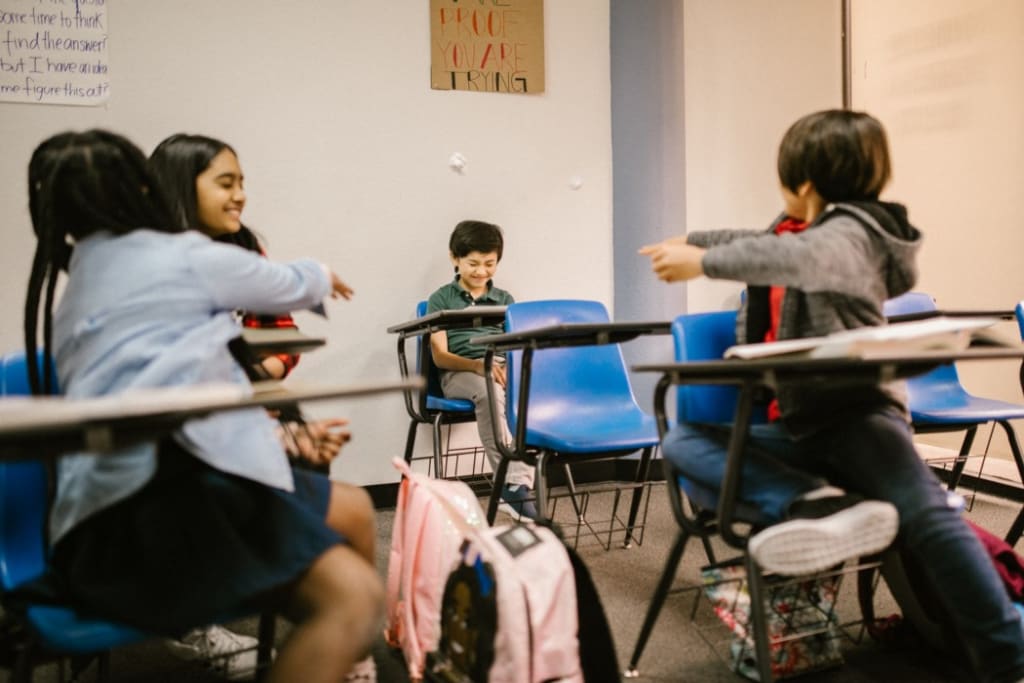Only Parents Can Guarantee the Success of their Kids
Public schools, charter schools, you must guide your children to the finish line.

Are charter schools the answer?
Everyone has had a great deal of contact with public education. Everyone is an expert — or so they think. We began a grand tradition in the United States to educate everyone. Many people would argue that our experiment has failed.
What is your experience with our school system as a student or as a parent of a student?
The charter school movement began as an experiment in education. It was felt that by removing the bureaucratic shackles, these schools would lead the way to a new direction in public education. I'm not sure that anyone even remembers that this was the original intention of charter schools.
Now almost thirty years after the first charter school was opened, parents perceive them more as an alternative to public schools than an experiment to improve public schools.
Have you opted for charter over public for your children?
As a teacher, I believe involved parenting is the single most important ingredient that ensures children's success in school. In a combined sixty years of teaching experience, my wife and I can not come up with a single scenario where a student problem could not be overcome with the help of parents doing their part on the home front. A call home to an involved parent always ends in a meaningful, successful intervention on the student's behalf.
Involved parents are the first to sign-up for charter schools. The educational success of their children is always a top priority. Involved parents maintain good parent-teacher communication, check and double-check the status of homework assignments. They prep, review, and grill their kids before tests, and they respond instantly to teacher communication. They always keep an ear to the ground about the best teacher in the next grade level. They are always looking out for what is best for their kids — so if they perceive a charter school as a better option, they go for it.
So what makes a charter school superior and how can public schools learn from this experiment?
Almost all teachers that teach at charter schools come directly from public schools. Teacher training does not vary much from one university to another. No premium school turns out charter school teachers, so it's not the teachers that make a difference. Many excellent teachers can be found within charter schools and public schools — poor teachers as well.
The curriculum is the same. Although charter school teachers have a bit more freedom in approaching the curriculum. There are also public school teachers with unique approaches as well.
To understand the difference between charter schools and public schools, you have to peek inside a public school classroom. I have some personal insight as a teacher with twenty years of experience. I'm also married to a kindergarten teacher with thirty-six years of experience, and we have two kids teaching in public schools right now.
Our daughter Lisa teaches kindergarten, and my wife volunteers in her classroom every week. This school year began as usual. Lisa had four uncontrollable students to the point that her regular classroom discipline plan did not affect their behavior. Abhorrent behaviors like hitting, biting, screaming, scratching, throwing chairs, swearing, and kicking disrupt the classroom's orderly function. This abnormal behavior is not new. Suzy experienced the same mayhem at the beginning of each school year for the last ten years before her retirement.
Two or three kids are sent to the principal's office each day, only to return an hour later to resume their disgusting behavior. Enough visits to the principal or a particularly egregious offense, and they get suspended for several days.
During this time, Lisa, their teacher, is in contact with the parents on a nightly basis, but these are not involved parents. These parents are full of excuses or have already given up, and they have no parenting skills or tools to back the teacher at home. In the meantime, though sorry for Lisa's plight, involved parents begin to look for other options for their kids — who could blame them?
I've heard this about this situation so many times from my wife that I've proposed a fire brigade for the first six weeks of school — an on-call fire team to whisk disruptive kids quickly from the classroom before their actions can be copied by others. Interventions and adaptations begin to take hold after the first six weeks, but overall, classroom behavior is not what it used to be because parent support is nowhere near where it used to be.
Gone is dependable parent help with homework assignments. Gone are the days when teachers could fill a list of parent volunteers for their classrooms. Now you are lucky if they show up for back-to-school night of a parent/teacher conference.
When I was a kid, trouble at school was one thing, the trouble I faced at home was quite another. A call home from the teacher was unthinkable — big trouble. Did your parents rush to your defense or did they back up the teacher?
Today a couple of calls home can quickly digress into a parent blaming the teacher for everything under the sun— their little darling can do no wrong. And woe unto the public school teacher who gets a midyear transfer student from a charter school.
A charter school does not have to put up with aberrant behavior, and they simply kick them back to public school, where we are obliged to accept them. Now you can better see the significant difference between charter schools and public schools.
But let me give you one more example. After ten years at a disadvantaged school with little parent support, I transferred to a middle-class school. During my last year at the old school, I told my principal that I wanted to experiment with back-to-school night, the traditional night where teachers introduce themselves and explain their expectations for the new school year. Instead of the typical Tuesday night where I might meet one or two parents, I decided to have a free hamburger lunch on Saturday. Food served AFTER my presentation. I got about 70 percent turnout.
The next year I had the typical Tuesday night open house at the middle-class school. It was standing room only, and you could hear a pin drop as I stepped in front of the crowd. There were parents, grandparents, all eager to assist in the coming school year. Shaking hands afterward at the door, I had assurance after assurance that if little Johnny or little Daisy ever got out of line, one phone call would solve the problem — parent involvement.
That evening a parent approached me and told me she would be my room mother and would handle arrangements for any extracurricular activities, and another mom offered to be my head driver. She would arrange all the other drivers for field trips. One call to her and she would take care of all my transportation needs. I'd never had a room mother before, let alone a director of transportation.
Parent involvement makes all the difference
The same reason charter schools are successful is why their practices can't be duplicated — parent involvement. In addition to outstanding support at home, charter school parents are also encouraged, even mandated to spend a specified number of hours in the classroom every month. Imagine a school stuffed with the most ardent PTA families — that's a charter school in our area. Parents are also aware that an undisciplined disruptive student can be summarily kicked out of the program and sent back to public school. Discipline at a charter school is a minimal issue.
My son teaches middle school math. He has a class that is about a quarter full of disruptive students who simply don't care. In past years they could be demoted to a lower level in math. This year everyone stays at grade level.
Did I mention class size? COVID is still with us, as are the mask mandates but middle school class size is back to 37. Thirty-seven masked kids! It's impossible even to tell who is talking. These kids are resistant to regular classroom discipline programs. Being sent to the principal does not deter them. Lunchtime detention does not affect their behavior, nor does getting suspended for a day. Why?
Because their parent’s don’t care
If your parents don't care, nothing that happens at school will have any impact at all. Most kids are affected by a phone call home. If the teacher can reach a caring parent on the other end of the line — problem solved. But if you reach a parent who has given up, you are likely to get an earful about your shortcomings and the school's shortcomings. The disruptive students remain in the class — the teacher's problem.
What is a teacher to do?
This is a significant factor in teacher burnout and the flood of teachers leaving the field. It makes for an unbearably long school year when a teacher is saddled with disruptive students and uncaring parents. It also makes teachers contemplate other careers.
Something needs to change! A handful of disruptive students in a classroom can derail instruction so that the kids who want to learn suffer because a few kids monopolize the teacher’s time with their constant misbehavior.
A clear lesson from the chart-school experiment is those disruptive students cannot be tolerated if the learning environment is to be preserved.
About the Creator
Gary Janosz
Grandfather, educator, businessperson, writing to understand our world and to make it a better place






Comments
There are no comments for this story
Be the first to respond and start the conversation.